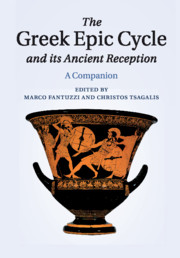Book contents
- Frontmatter
- Contents
- List of illustrations
- List of contributors
- Editorial note
- Introduction: Kyklos, the Epic Cycle and Cyclic poetry
- PART I APPROACHES TO THE EPIC CYCLE
- PART II EPICS
- 11 Theogony and Titanomachy
- 12 Oedipodea
- 13 Thebaid
- 14 Epigonoi
- 15 Alcmeonis
- 16 Cypria
- 17 Aethiopis
- 18 Ilias parva
- 19 Iliou persis
- 20 Nostoi
- 21 Telegony
- PART III THE FORTUNE OF THE EPIC CYCLE IN THE ANCIENT WORLD
- Works cited
- Index of principal passages
- Index nominum et rerum
13 - Thebaid
from PART II - EPICS
Published online by Cambridge University Press: 05 August 2015
- Frontmatter
- Contents
- List of illustrations
- List of contributors
- Editorial note
- Introduction: Kyklos, the Epic Cycle and Cyclic poetry
- PART I APPROACHES TO THE EPIC CYCLE
- PART II EPICS
- 11 Theogony and Titanomachy
- 12 Oedipodea
- 13 Thebaid
- 14 Epigonoi
- 15 Alcmeonis
- 16 Cypria
- 17 Aethiopis
- 18 Ilias parva
- 19 Iliou persis
- 20 Nostoi
- 21 Telegony
- PART III THE FORTUNE OF THE EPIC CYCLE IN THE ANCIENT WORLD
- Works cited
- Index of principal passages
- Index nominum et rerum
Summary
In the Myth of Ages (Works and Days 156–73), Hesiod provides an overview of the age of heroes by making reference to two legendary tales: the Trojan War and the death at Thebes of the warlords who fought over ‘the flocks of Oedipus’ (163). The meaning of the expression used by Hesiod is ambiguous. Nevertheless, it is very unlikely that the Hesiodic version of the myth differs in any significant way from the established version prevalent in later times. In other words, it is likely that Hesiod's reference to the ‘flocks’ of Oedipus denotes the fortune – pecunia (μῆλα) – of Oedipus, the king of Thebes, which provoked the tragic conflict between his sons, Eteocles and Polynices. Various allusions are made to this saga in both the Iliad and the Odyssey, which offer a fragmentary account of the course of events that the Thebaid sets out to recount in greater detail.
A detailed narrative of this legend is given in Ps.-Apollodorus’ Bibliotheca (3.5.7–3.7.1). When Oedipus relinquished the throne at Thebes (on his death or on leaving the country, as dramatized in Sophocles' Oedipus at Colonus), his sons reached an agreement regarding their father's inheritance: either Polynices took possession of the material goods (the robe and the necklace of Harmonia) while Eteocles claimed the royal title and dignity, or the two brothers would agree to alternate the throne of Thebes. Polynices arrives in Argos as an exile at the same time as Tydeus, and a fight breaks out between them. Adrastus, the king of Argos, is a witness to the scene and interprets it in terms of the prophecy that foretold he was to give his daughters' (Argia and Deipyle) hands in marriage to a lion and a wild boar, the animals depicted on the shields carried by Polynices and Tydeus, respectively. Adrastus decides to help Oedipus' son win back his family's throne and organizes an expedition against Thebes, a campaign which is joined by seven warlords, to whom the literary tradition attributes a variety of names.
- Type
- Chapter
- Information
- The Greek Epic Cycle and its Ancient ReceptionA Companion, pp. 226 - 243Publisher: Cambridge University PressPrint publication year: 2015
- 5
- Cited by



